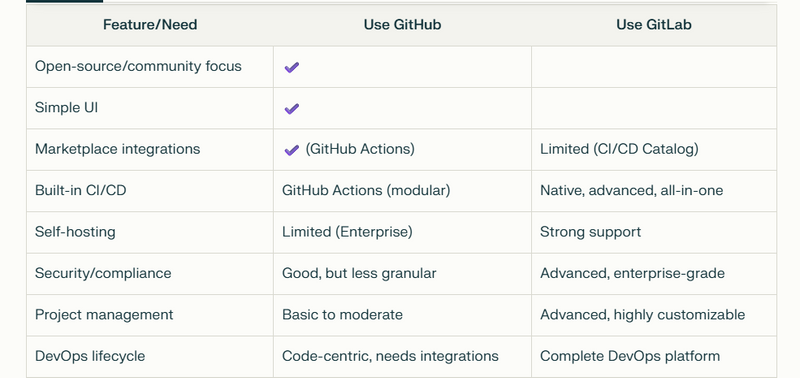When to Use GitLab
When to Use GitHub
set up CI/CD using GitLab for projects where your code is hosted on GitHub
You should use GitHub or GitLab based on your team's workflow needs, project scale, security requirements, and CI/CD preferences. Here’s a detailed breakdown of when and why you might choose one over the other, based on current industry comparisons:
When to Use GitHub
You prioritize code collaboration and open-source: GitHub is the largest Git hosting platform with a massive user base and community, making it ideal for open-source projects and public repositories.
You want a simple, intuitive interface: GitHub offers a user-friendly experience, especially for smaller teams or those new to version control.
You need a strong ecosystem of integrations: GitHub Actions provides a modular CI/CD system with a vast marketplace of reusable actions, making it easy to automate builds, tests, and deployments.
You rely on pull request workflows: GitHub’s pull request system is widely adopted and familiar to many developers.
You prefer SaaS/cloud-hosted solutions: While self-hosted options exist, GitHub is primarily cloud-based, which reduces infrastructure management overhead.
When to Use GitLab
You want an all-in-one DevOps platform: GitLab offers a complete suite-source control, built-in CI/CD, issue tracking, project management, security, and compliance-integrated into a single application.
You need robust, built-in CI/CD: GitLab’s CI/CD is native, mature, and highly customizable, with advanced features like merge trains, parent-child pipelines, and security/compliance tools.
You require self-hosting or more control: GitLab provides a strong self-hosted option, giving you full control over your data and infrastructure-important for organizations with strict compliance or data residency needs.
You have advanced security or compliance requirements: GitLab offers fine-grained access controls, built-in security scanning, and license compliance tools, making it suitable for enterprises and regulated industries.
You want more granular project management: GitLab’s issue tracking and project management features are more powerful and customizable, especially in paid tiers
set up CI/CD using GitLab for projects where your code is hosted on GitHub
How It Works
GitLab offers native integration with GitHub. You can connect your GitHub repository to a GitLab project configured specifically for CI/CD.
When you push code to GitHub, GitLab can automatically detect changes, run your CI/CD pipelines, and report the results back to both GitHub and GitLab.
This setup is useful if you want to use GitLab’s advanced CI/CD features while keeping your code and collaboration on GitHub.
Step-by-Step Setup
- Create a GitLab Account
Sign up or log in at gitlab.com.
- Create a New Project for External Repository
In GitLab, go to “Create new project/repository.”
Select the option “Run CI/CD for external repository.”
Choose GitHub as the source.
- Connect to Your GitHub Repository
Authorize GitLab to access your GitHub account.
Select the repository you want to connect.
GitLab will set up a mirrored project for CI/CD (it will not import issues, merge requests, or wikis unless you enable them).
- Add Your .gitlab-ci.yml Pipeline
In your GitHub repository, add a .gitlab-ci.yml file at the root. This file defines your CI/CD pipeline stages and jobs.
Example:
stages:
- build
- test
build_job:
stage: build
script:
- echo "Building project..."
test_job:
stage: test
script:
- echo "Running tests..."
Configure Webhooks (if needed)
GitLab may automatically set up webhooks to listen for GitHub events (pushes, pull requests).
If not, you can manually add a webhook in your GitHub repo settings pointing to your GitLab project.
- Run Pipelines
Now, every time you push code to GitHub, GitLab will automatically trigger the CI/CD pipeline and display results in both platforms.
Key Points
No code migration required: Your code stays on GitHub.
GitLab handles CI/CD: All builds, tests, and deployments are managed by GitLab CI/CD.
Results in both places: Pipeline results can be viewed in GitHub (as status checks) and in GitLab.
Free for public projects: GitLab offers generous free CI/CD minutes for open-source projects


Top comments (0)